- Home
- Lin Carter
The Nemesis of Evil Page 6
The Nemesis of Evil Read online
Page 6
None, however, was required. Scorchy was in Sleepyland. The hooded man reversed his hold on the gun and showed the cold black eye of its muzzle to the wide-eyed young lady.
“The joy ride ends right here, girlie,” he snarled. “Get out of that car and help my pals into the limo. No tricks, now! I owe you somethin’ for this slug in the shoulder, and it wouldn’t take much for me to pay you off in hot lead. Get moving!”
There was nothing else for her to do. She helped get the three groggy, half-conscious men into the long black car, then half-carried and half-dragged Scorchy into the back seat, taking her place beside him. The man with the gun got behind the wheel. In a moment the black limousine pulled off the highway and went down a deeply rutted side road, vanishing among the trees, with Scorchy Muldoon and Elvira Higgins the helpless prisoners of the Brotherhood of Lemurian Wisdom.
Chapter 7 — When Dead Men Walk
It got later in the afternoon, and still Scorchy did not come. Zarkon remained his imperturbable self, but Nick Naldini was getting restless. Although he teased the little Irishman unmercifully at times, there was a powerful bond of comradeship between the sardonic ex-magician and the little runty red-headed boxer.
“Chief, in my opinion something has happened to Muldoon and the girl,” said Nick uneasily. “Perhaps they were followed by the black car, after all. They should have been here twenty minutes ago!”
Zarkon nodded calmly. “I think you are right, Nick. Menlo, fetch the others. Mr. Ryan, have you a fast car we can borrow?”
“Certainly, Prince Zarkon,” said the wealthy publisher. Lifting a phone, he instructed his driver to bring a big red sportscar around to the front. Zarkon and his lieutenants unlimbered some peculiar bits of apparatus from one of their equipment cases and followed Ryan to the gravel-strewn driveway, climbing in the car. Harrigan and Naldini took the front seat, with Menlo Parker and Doc Jenkins and Zarkon himself in the rear.
“Mind if I join you?” asked the millionaire. “In case your friend has been captured, my presence might come in handy.” Zarkon nodded briefly, busy with the mechanism on his knee. Ryan got in the front seat and closed the door. Gravel crunching, Harrigan took a steep curve and drove to the highway leading in to Palma Laguna.
Menlo Parker, holding a small instrument to his ear, snapped his fingers. “Highway accident,” he chirped brightly. “Car banged into a pole a few miles on. Police radio call says the driver of a Greyhound bus saw four men in red robes get out of the long black car and converge on the wreck. Says they were probably going to the assistance of the driver of the wrecked car. No bodies reported.”
Zarkon said nothing, studying the instrument on his lap. Nor did the other men make any response, except that Ace Harrigan stepped up the speed and Nick Naldini tugged furiously on the waxed ends of his Mephistophelian mustache. Ryan gathered that the instrument Parker held was a radio receiver; if so, it was of an advanced design, since it was no larger than a folder of matches.
In another few minutes they reached the scene of the accident. Four highway patrol cruisers were pulled up, blocking oncoming traffic from the far lane. When he saw and recognized the wrecked car as the one he had himself rented that very morning, Nick Naldini cursed under his breath in the sort of Italian seldom heard outside the gutters of Naples.
Zarkon suggested they pull up before the double-parked cruisers. Ace Harrigan leaned out and showed his credentials to the highway patrolman who came over to wave them on. Ryan could not make out what the aviator said to the patrolman, but he recognized the look of awe that came over the man’s face when he realized who was in the back seat. Zarkon got out, nodding in response to the snappy salute the patrolman threw, and strolled over to look at the car. The patrolman followed him.
“Signs of a gun battle here and here, sir. Blood on the pavement over here. No bodies, though, and the second car seems to have driven away.”
Zarkon asked if any blood had been found on the interior of the wrecked car. The patrolman shook his head and an expression of relief simultaneously passed over the faces of Nick Naldini, Doc Jenkins, Menlo Parker, and Ace Harrigan. Scorchy had probably been taken alive, in that case. There would have been no reason for his attackers to have carried off a corpse.
Menlo Parker fiddled with a small electronic device. A red indicator light blinked, arrow-like, pointing across the road.
“The stool-pigeon is over there in the bushes,” the skinny scientist confided to Ace Harrigan. The aviator opened the car door and got out.
“I’ll go get it while the chief is busy,” he said. Menlo handed him the small instrument and Harrigan went across the highway and fished through the bushes until he found the small gray case Scorchy Muldoon had thrown away.
Ryan had observed all this, and his curiosity must have developed into an uncontrollable itch, for he leaned over and diffidently asked Nick Naldini what the frail little physicist had meant by “the stool-pigeon.”
The ex-vaudevillian smiled genially. He loved an audience and delighted in expounding on subjects wherein he was an expert. At times like these, or when engaging attractive young women in casual conversation, the lanky, long-legged magician waxed eloquent in a histrionic manner that exposed his secret lifelong ambition, which was to have trod the boards as a Shakespearian actor.
“Tush, my good sir, your inquiry need afford you no embarrassment,” he drawled in his hoarse, whiskey voice. “ ‘Tis remarkably simple, after all. Each of our number is continuously exposed to the risk of capture by the foe, and, more oft than not, we possess about our person a choice and valuable item of evidence. To prevent such from falling into the crime-soiled hands of evildoers, ‘tis our amusing custom to secrete amongst our garments small containers of a curious metallic composition, fabricated from an alloy of uranium. My colleague, Parker, has just tracked down one such small container, tossed over yonder broad highway by the unfortunate Muldoon —”
“Uranium alloy?” murmured the publisher nervously. “But — isn’t that stuff dangerous? I mean, the radiation hazard —”
“Nonsense, my good sir!” rasped the ex-magician. “The alloy exudes a degree of radioactivity of no more harmful potency than the pinch of radium commonly found on a wristwatch with a luminous dial. The radioactivity can, however, be detected to a nicety by our instruments, and its location we are able to pinpoint, yes, even from a moving airplane.”
Uranium in metal form and long-distance Geiger counters were new to the experience of Robert Russell Ryan, but he somehow sensed it would do him no good to ask questions about these surprising inventions. In this, he was quite correct. The secret of these and the other technologically advanced instruments the Omega men regularly employed were part of the secret origin of Zarkon himself. And that secret was carefully concealed from the world.
Zarkon knelt to study tire marks on the highway. He straightened after a moment, said goodbye to the patrolmen, and rejoined his men in the sports-car.
“Scorchy and Miss Higgins were carried off in a large foreign car, probably an expensive, imported Supra limousine,” he said. “Are you picking up the Squealer, Menlo?”
The scientist nodded. “Over that way,” he snapped, “moving slow.”
“Down that dirt road, probably,” said Ace Harrigan. He clashed the gears. The sportscar turned into the side road and began bouncing along over the ruts. “No wonder they’re moving slow!” grunted Harrigan. Nick Naldini turned to the newspaper publisher.
“The Squealer is a miniaturized radio device we all wear,” he explained. “It issues a carrier wave when turned on; Menlo is monitoring it now on his portable. That way we can follow the car carrying Scorchy and the girl to wherever they are going.”
Ryan said nothing, but he was beginning to feel impressed by the smooth professionalism of these men and the way they swung into action.
When Scorchy awoke, he was stretched out against damp concrete with his wrists tied behind him. His skull felt like an egg shell that had come out
second-best in an argument with a steamroller. First that goose egg on his forehead from the wreck of the car, then the clout from the barrel of the six-shooter against the back of his head. He was distinctly unhappy, and when he moved at all it was without alacrity, as if too swift a motion would cause his head to fall apart.
Squinting around, he saw Elvira Higgins some distance away, sitting up against a stone wall with her hands behind her, probably tied, as were his own. They seemed to be in some sort of a cellar. At least, the room was dark and damp and smelled musty and had a concrete floor and stone walls. No one else seemed to be in the vicinity. He decided to sit up, and did so gingerly and in stages.
He still wore his jacket, he noticed. With numb fingers he counted the buttons on his cuff to make sure he still wore the one they called the Squealer because of the superminiaturized radio it concealed. It was still there, all right.
The pockets of his jacket were turned inside out. That meant he had been searched and the photographs from MacAndrews’ camera had been taken. He sent the frightened girl a grin that was meant to be cheerful and encouraging, but that ended up more like a grimace of pain because of the discomfort it cost him to flex his cheek-muscles. He was about to say something to her when one of the hooded men came clumping down the cellar stairs to show him the business end of a revolver. It was the one he had belted four times in the belly, then kicked in the jaw. The fellow did not look particularly friendly. Scorchy decided not to antagonize him with chit-chat.
With the tips of his fingers, he explored his bonds. As far as he could tell, his hands had been tied quite skillfully. For the first time in his life the bantamweight boxer wished he were Nick Naldini. The lanky escape artist could have squirmed out of these ropes quicker than you could say “Harry Houdini.”
Another hooded man came down the stairs. This one had his arm in a sling, the sling hastily improvised from cloth torn from the lining of his robes. His long horse-face looked greenish, and his mouth was twisted as if from pain. The sharp medicinal stench of raw whiskey hung around him like a cloud.
“Feeling any better, Leo?” asked the one holding the gun on Scorchy. The second man gave him a contemptuous look.
“How would you feel with a slug from that cannon through you?” he snarled. Then, turning to Elvira Higgins, the injured man said: “Sister, they oughta pass a law against horse pistols like that one. Was your grandpappy Buffalo Bill?”
“Did you get the boss on the set upstairs?” asked the first man. The man with the injured shoulder nodded, then winced at the pain his shoulder caused him when he nodded.
“We got to get rid of these two meddlers real quick an’ get back to our stations,” he grunted. “The cops are goin’ over the wreck with a fine-toothed comb, and may start checkin’ out the dirt roads for tire tracks.”
“Shucks, Leo, they won’t find none!” the guard protested. “Ain’t had no rain in these parts for weeks, and what with all the ruts in that road, it would take more than a bunch of dumb cops to trail the car here!”
“They got more than cops,” said the injured man with a venomous glance at Scorchy Muldoon. “The Mick over there who kicked you silly is one of Prince Zarkon’s men!”
The guard sucked in his breath with a loud hiss. There was a ringing, throbbing silence. Then he said, unsteadily, “What’re we gonna do?”
The second man nodded at the gun the first man held, then nodded over at the two captives.
“Kill ‘em,” he said flatly. “And dump ‘em somewhere. Do it now, Coker. We gotta make tracks outa here.”
The second man said nothing, but gulped. Then he opened and closed the chamber of his revolver, clicked the safety off, and came over to level the pistol at Scorchy Muldoon’s brow.
Fire blazed and thunder cracked resoundingly in the damp, dark, echoing cellar.
The red sportscar jolted and bounced along over the dirt road that wove in and out between heavy walls of slash pine and scrub oak.
“Did Scorchy use the stool-pigeon?” inquired Prince Zarkon after they had been bumping along for five minutes or so.
“Oh, yeah, chief, sorry, it slipped my mind,” said Ace Harrigan. “Nick, dig the thing out of my pocket, will you? This road’s so bad I don’t dare let go of the wheel.”
The magician extracted the flat metal case from the pocket of the aviator’s jacket and handed it back to the Lord of the Unknown, who sat in the back seat. Zarkon snapped open the little metal case and extracted therefrom a single photograph.
“One of the pictures from MacAndrews’ camera!” said Doc Jenkins in his heavy, dull voice. “Scorchy said the girl found the reporter’s camera and developed the roll of film. Why just one picture, I wonder?”
Zarkon said nothing, studying the glossy enlargement. From one of the many pockets in the lining of his gray suede jacket he extracted a powerful lens and a small pocket flashlight.
Snapping on the light, he pored over every detail of the picture, examining it under the lens. His immobile features seldom displayed any emotion, but they did so now. Shock, disbelief, and amazement were visible in his face. Without comment he passed the photo to Doc Jenkins.
The huge man looked it over narrowly, then ran one ham-sized hand through his sparse, sandy hair, his dull, watery eyes glistening with astonishment.
“But he’s —” he began.
Zarkon nodded grimly.
“Yes, I know. I just wanted it confirmed through your memory for faces,” he said.
The man with the camera eyes wagged his massive head in stunned disbelief. “No doubt about it, chief; I’d stake my reputation on it!”
Zarkon said nothing, looking ahead stonily.
The bald, bullet-headed man in the picture was the leader of the Brotherhood, the man called Lucifer whom MacAndrews had photographed the previous morning at the meeting on the mountain. Zarkon recognized him instantly, for they had battled once before. That was not what had caused shock and disbelief and amazement, though. Those had been natural reactions.
Because the man in the picture had died five years before.
Chapter 8 — The Fight in the Shack
The red sportscar bumped and jounced over the rutted dirt track that wound a narrow path between thick walls of pine and oak. Menlo Parker bent over the location finder, sharp eyes intent on the indicator.
“We’re getting near him now,” he said in his peevish tone. “The Squealer works just fine, chief; even after that last stage of miniaturization, the signal is sharp and definite.”
The road angled about sharply. Suddenly a clearing opened in the brush, revealing a broken-down farmhouse and a stretch of cleared field. Broken windows gawped, loose screens dangled crazily askew, and the house paint had long since worn away so that the boards were silvery from exposure to wind and rain.
“That house, maybe,” suggested Ace Harrigan.
“Maybe,” Zarkon agreed. “Menlo, what do you think?”
The shriveled little scientist nodded. “He’s there, all right. There, or within a fifty-yard radius of the shack. Can’t be more definite than that.”
“Good enough,” said Zarkon. “Ace, pull up across the road. Condition ‘A,’ gentlemen. Let’s go!”
The Omega men drew from beneath their coats curiously light, flat pistols seemingly made of some dull plastic. Checking them, they got out of the car, spread out in a wide half circle, and began closing in on the rundown shack. Robert Russell Ryan brought up the rear, keeping directly behind Zarkon. The big man in gun-metal gray moved as silently and swiftly as a drifting shadow, the newspaperman noticed. Like a substanceless wraith, he glided across the dirt road. His sharp, wary black eyes were everywhere, probing every shadow, every bush, catching the slightest rustle in the underbrush. Alone of them all, he was unarmed. Or was he? His sensitive, long-fingered hands, held half open, were extended and spread before him. It was almost as if they gripped weapons invisible to human eyes.
The faintest chill moved up the millionaire publi
sher’s spine; there was something uncanny, even unhuman, about this tall, superb man with the quiet voice and strangely emotionless manner.
“Careless of them not to post a lookout,” drawled Nick Naldini.
“It is,” nodded Ace Harrigan. “Wonder where they hid the car?”
“Maybe around back,” said Nick. But he never completed his sentence. For just then a muffled explosion went thump! and an unearthly blue-white brilliance stabbed from behind dust-scummed basement windows. From within came noise and plenty of it. Men yelled, bumped, fell in a clatter. Wood splintered, furniture or something went crashing over. A girl shrieked.
“In. Quickly!” snapped Zarkon.
Doc Jenkins was the first to jump upon the sagging porch. He reared back and kicked the frame of the door with the flat of his foot. Those huge feet must have packed a wallop commensurate to their size and weight, for the lock cracked with a sharp sound of breaking metal and the door broke inward, half torn off its hinges. The Omega men shouldered through it into a musty-smelling room. Sunlight filtered through broken windows on mildewed, threadbare carpet, odds and ends of furniture, a cast-iron stove. No one was in the room, but even as they entered, three men came charging up the cellar stairs and burst into the living room; stopping dead at the sight of strangers, they lifted their guns.
But Zarkon was among them, drifting like a wisp of mist, his empty hands reaching. As Robert Russell Ryan watched with astonishment written on his tense features, those long-fingered hands floated out, touching men here and there with deft, unerring strokes. They were unhurried, those strokes, and looked to be as gentle as so many caresses. But everywhere Zarkon touched, fierce, unendurable pain exploded and men shrieked suddenly and unnervingly and collapsed.

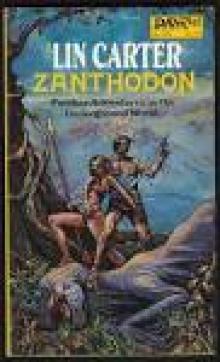 Zanthodon
Zanthodon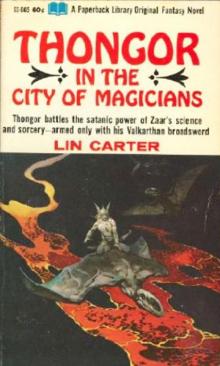 Thongor in the City of Magicians
Thongor in the City of Magicians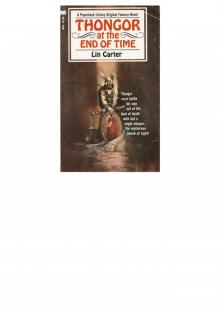 Thongor at the End of Time
Thongor at the End of Time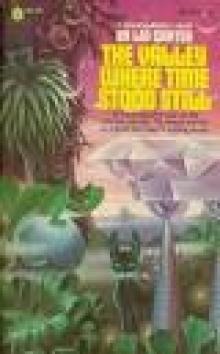 The Valley Where Time Stood Still
The Valley Where Time Stood Still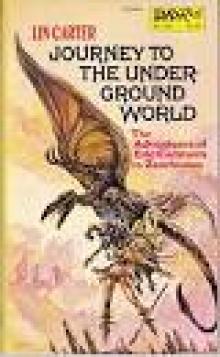 Journey To The Underground World
Journey To The Underground World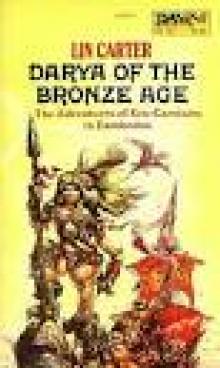 Darya of The Bronze Age
Darya of The Bronze Age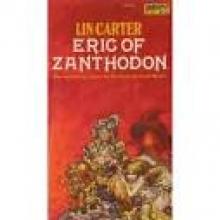 Eric of Zanthodon
Eric of Zanthodon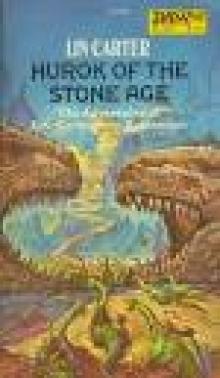 Hurok Of The Stone Age
Hurok Of The Stone Age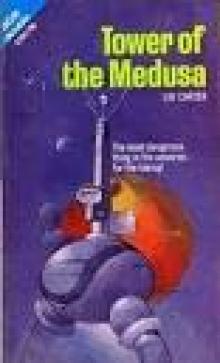 Tower Of The Medusa
Tower Of The Medusa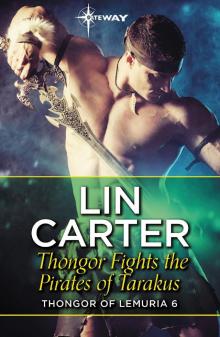 Thongor Fights the Pirates of Tarakus
Thongor Fights the Pirates of Tarakus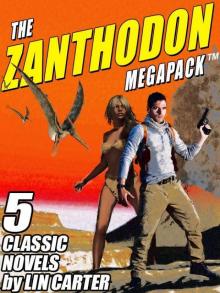 The Zanthodon MEGAPACK ™: The Complete 5-Book Series
The Zanthodon MEGAPACK ™: The Complete 5-Book Series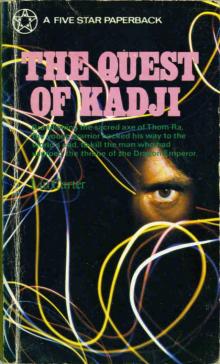 The Quest of Kadji
The Quest of Kadji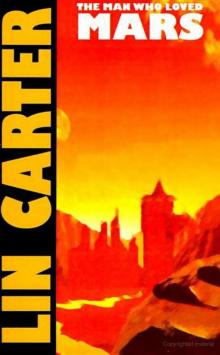 Lin Carter - The Man Who Loved Mars
Lin Carter - The Man Who Loved Mars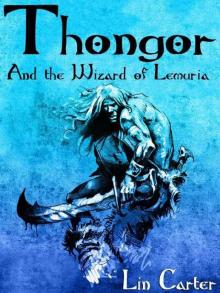 Thongor and the Wizard of Lemuria
Thongor and the Wizard of Lemuria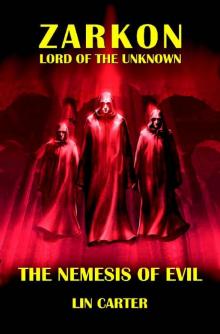 The Nemesis of Evil
The Nemesis of Evil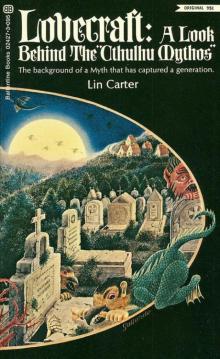 H.P.Lovecraft: A Look Behind Cthulhu Mythos
H.P.Lovecraft: A Look Behind Cthulhu Mythos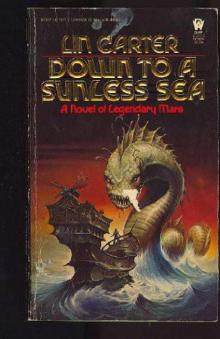 Lin Carter - Down to a Sunless Sea
Lin Carter - Down to a Sunless Sea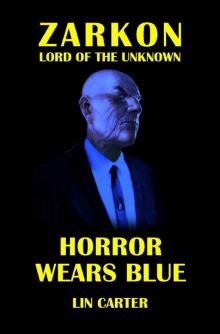 Horror Wears Blue
Horror Wears Blue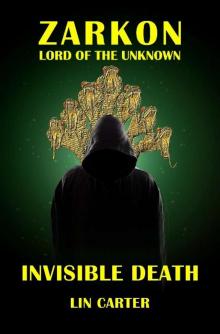 Invisible Death
Invisible Death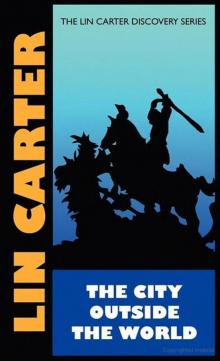 Lin Carter - The City Outside the World
Lin Carter - The City Outside the World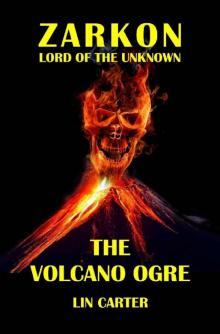 The Volcano Ogre
The Volcano Ogre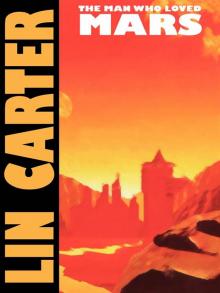 The Man Who Loved Mars
The Man Who Loved Mars